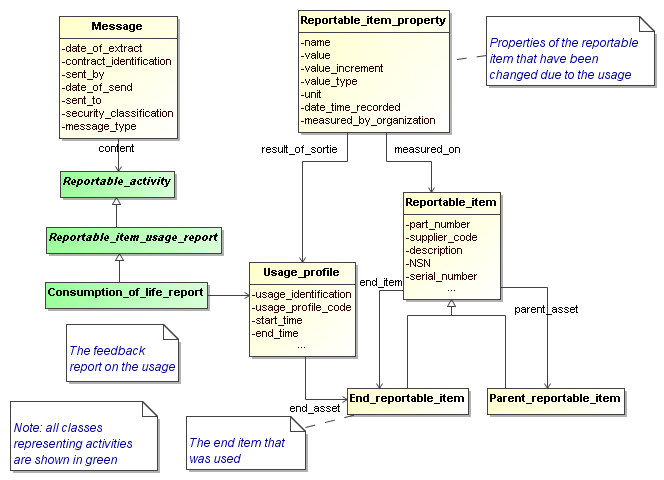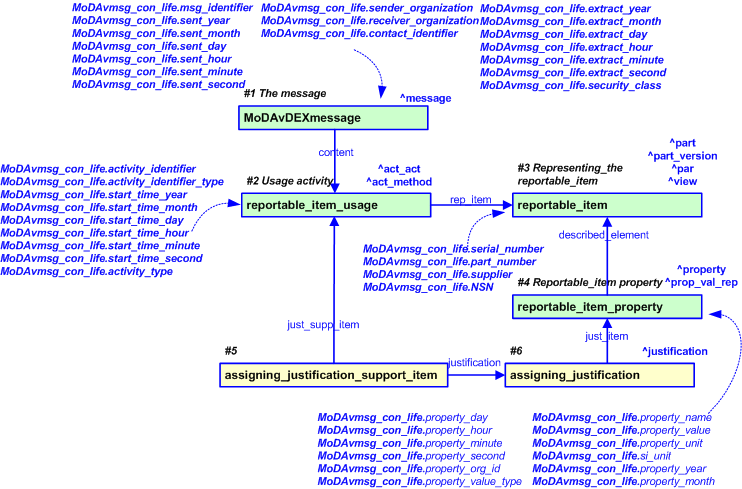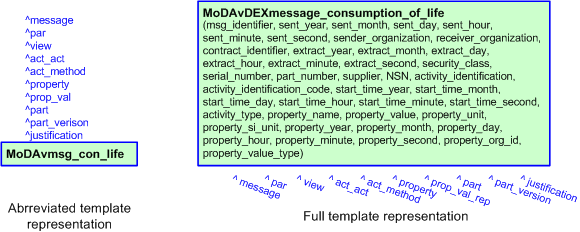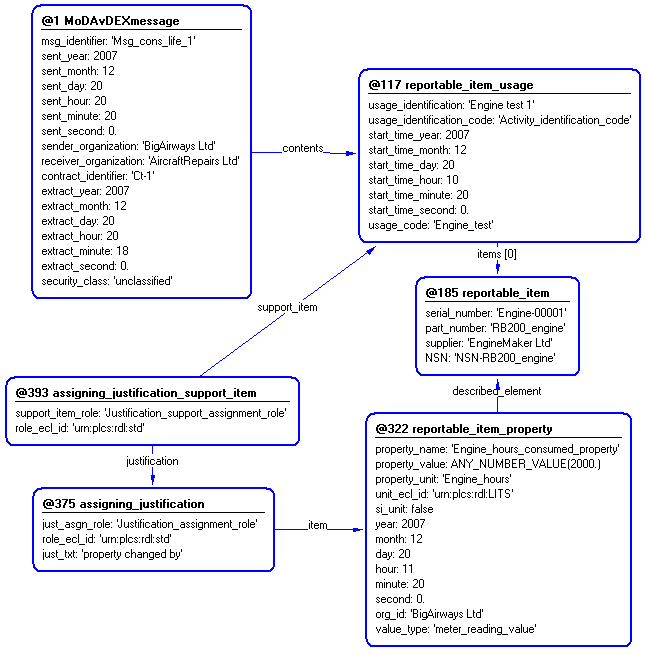Template:— MoDAvDEXmessage_consumption_of_life (MoDAvmsg_con_life)
Context:— MoDAvDEX |
Date: 2008/03/12 21:25:54
Revision: 1.17
|
This section specifies the template MoDAvDEXmessage_consumption_of_life.
NOTE
The template has been defined in the context of
MoDAvDEX.
Refer to the business context for details of related templates.
NOTE
An explanation of a template and the associated instantiation path is
provided in the
Template overview
section.
This template describes how to represent a message reporting when a reportable item
has consumed life.
Consumption of life messages represent a record of when a reportable items life has been
consumed by some activity.
The consumption of life messages are triggered when the activity that lead to the consumption of
life has completed..
The EXPRESS-G diagram in
Figure
2
shows the templates and EXPRESS entities that are required
to represent the template
"MoDAvDEXmessage_consumption_of_life".
The text highlighted in blue shows the template parameters.
Figure 2 — An EXPRESS-G representation of the Information model for MoDAvDEXmessage_consumption_of_life
The graphic for the template to be used in other EXPRESS-G diagrams
is shown in Figure
3
below.
Figure 3 — The graphical representation of the MoDAvDEXmessage_consumption_of_life template
The following input parameters are defined for this template:
The identifier of the message.
Calendar_date year_component of the date that the message was sent.
Calendar_date month_component of the date that the message was sent.
Calendar_date day_component of the date that the message was sent.
Local_time hour_component of the date and time that the message was sent.
Local_time minute_component of the date and time that the message was sent. This
parameter is optional. If not given, it will remain unset.
Local_time second_component of the date and time that the message was sent. This
parameter is optional. If not given, it will remain unset.
The name or identifier of the sending organization.
The name or identifier of the receiving organization.
The name or identifier of the contract.
Calendar_date year_component of the date that the information in the message was
extracted from the sending system.
Calendar_date month_component of the date that the information in the message
was extracted from the sending system.
Calendar_date day_component of the date that the information in the message was
extracted from the sending system.
Local_time hour_component of the date that the information in the message was
extracted from the sending system.
Local_time minute_component of the date that the information in the message was
extracted from the sending system. This parameter is optional. If not given, it will remain
unset.
Local_time day_component of the date and time the message is extracted. This
parameter is optional. If not given, it will remain unset.
The following classes and their sub-classes can be used:
classifications: [ModAvDEX_Security_classification]![[warning:]](../../../../../../images/dex/warning.gif) Error RDL4: The URI urn:plcs:rdl:LITS is not listed in dexlib/data/refdata/rdl_index.xml
Error RDL4: The URI urn:plcs:rdl:LITS is not listed in dexlib/data/refdata/rdl_index.xml
The serial_number of the reportable item that is input to the activity.
The part_number of the reportable item that is input to the activity.
supplier (Default=/NULL,Type='STRING', Optional)
The supplier of the reportable item that is input to the activity.
NSN (Default=/NULL,Type='STRING', Optional)
The NSN of the reportable item that is input to the activity.
The identifier of the activity.
The type of identifier of the activity.
The following classes and their sub-classes can be used:
classifications: [ModAvDEX_Product_usage_code]![[warning:]](../../../../../../images/dex/warning.gif) Error RDL4: The URI urn:plcs:rdl:LITS is not listed in dexlib/data/refdata/rdl_index.xml
Error RDL4: The URI urn:plcs:rdl:LITS is not listed in dexlib/data/refdata/rdl_index.xml
Calendar_date year_component of the date the activity was started.
Calendar_date month_component of the date the activity was started.
Calendar_date day_component of the date the activity was started.
Local_time year_component of the date and time the date the activity was started.
Local_time minute_component of the date and time the activity started.
This parameter is optional. If not given, it will remain unset.
Local_time day_component of the date and time the activity was started.
This parameter is optional. If not given, it will remain unset.
A code specifying the type of usage activity.
The following classes and their sub-classes can be used:
The class name corresponding to the property name.
The following classes and their sub-classes can be used:
classifications: [ModAvDEX_Product_property]![[warning:]](../../../../../../images/dex/warning.gif) Error RDL4: The URI urn:plcs:rdl:LITS is not listed in dexlib/data/refdata/rdl_index.xml
Error RDL4: The URI urn:plcs:rdl:LITS is not listed in dexlib/data/refdata/rdl_index.xml
The value of the property.
The datatype must also be indicated in this parameter, e.g.
"ANY_NUMBER_VALUE(5)".
The class name of the unit in which the value is expressed.
The following classes and their sub-classes can be used:
classifications: [ModAvDEX_Unit]![[warning:]](../../../../../../images/dex/warning.gif) Error RDL4: The URI urn:plcs:rdl:LITS is not listed in dexlib/data/refdata/rdl_index.xml
Error RDL4: The URI urn:plcs:rdl:LITS is not listed in dexlib/data/refdata/rdl_index.xml
Value should be set to true if the unit is a SI base unit defined by ISO, i.e.
kilogram (kg) for Mass,
second (s) for Time,
metre (m) for Displacement,
ampere (A) for Electrical current,
kelvin (K) for Temperature,
mole (mol) for Amount of substance, and
candela (cd) for Luminous intensity. If this is not the case it should be set to false.
Note that the representation of true and false depends on exchange format. In Part 11 (a STEP file) true is
represented by the string ".T.", and false by ".F.", while in Part 28 (XML) they are represented by text strings
"true"
and "false".
The year component of the creation date of the property value.
The month component of the creation date of the property value.
The day component of the creation date of the property value.
The hour component of the creation date of the property value.
The minute component of the creation date of the property value
This parameter is optional. If not given, it will remain unset.
The second component of the creation date of the property value
This parameter is optional. If not given, it will remain unset.
The name or identifier of the organization declaring the property.
meter_reading - the value measured on the meter;
cumulative - the cumulative value taking into account the changing of meters;
sortie - the value of sortie related data not use for calculating life. E.g fuel consumed.
The following reference parameters are defined for this template:
Allow the
Message
entity instantiated in this path to be referenced when this template is used.
Note: The
Message
entity can be referenced in a template path by:
%^target = $MoDAvDEXmessage_consumption_of_life.message%
where
target
is the parameter to which the
Message
is bound.
Allow the
Product_as_realized
entity instantiated in this path to be referenced when this template is used.
%^target = $MoDAvDEXmessage_consumption_of_life.par%
%^target = $MoDAvDEXmessage_consumption_of_life.view%
Allow the
Activity_actual
entity instantiated in this path to be referenced when this template is used.
%^target = $MoDAvDEXmessage_consumption_of_life.act_act%
Allow the
Activity_method
entity instantiated in this path to be referenced when this template is used.
%^target = $MoDAvDEXmessage_consumption_of_life.act_method%
Allow the
Assigned_property
entity instantiated in this path to be referenced when this template is used.
%^target = $MoDAvDEXmessage_consumption_of_life.property%
%^target = $MoDAvDEXmessage_consumption_of_life.prop_val_rep%
Allow the
Part
entity instantiated in this path to be referenced when this template is used.
Note: The
Part
entity can be referenced in a template path by:
%^target = $MoDAvDEXmessage_consumption_of_life.part%
where
target
is the parameter to which the
Part
is bound.
Allow the
Part_version
entity instantiated in this path to be referenced when this template is used.
Note: The
Part_version
entity can be referenced in a template path by:
%^target = $MoDAvDEXmessage_consumption_of_life.part_version%
where
target
is the parameter to which the
Part_version
is bound.
Allow the
Justification
entity instantiated in this path to be referenced when this template is used.
Note: The
Justification
entity can be referenced in a template path by:
%^target = $MoDAvDEXmessage_consumption_of_life.justification%
where
target
is the parameter to which the
Justification
is bound.
The instantiation path shown below specifies the entities that are to be
instantiated by the template.
A description of templates and the syntax for the instantiation path is
provided in the
Templates Help/Information section.
-- Instantiate the reportable item /
reportable_item(
serial_number=@serial_number,
part_number=@part_number,
supplier=@supplier,
NSN=@NSN)/
%^par = $reportable_item.par%
%^view = $reportable_item.view%
%^part = $reportable_item.part%
%^part_version = $reportable_item.part_version%
/
reportable_item_usage(
usage_identification=@activity_identification,
usage_identification_code=@activity_identification_code,
start_time_year=@start_time_year,
start_time_month=@start_time_month,
start_time_day=@start_time_day,
start_time_hour=@start_time_hour,
start_time_minute=@start_time_minute,
start_time_second=@start_time_second,
usage_code=@activity_type,
rep_item=^par)/
%^act_act = $reportable_item_usage.act_act%
%^act_method = $reportable_item_usage.act_method%
/
MoDAvDEXmessage(
msg_identifier=@msg_identifier,
sent_year=@sent_year,
sent_month=@sent_month,
sent_day=@sent_day,
sent_hour=@sent_hour,
sent_minute=@sent_minute,
sent_second=@sent_second,
sender_organization=@sender_organization,
receiver_organization=@receiver_organization,
contract_identifier=@contract_identifier,
extract_year=@extract_year,
extract_month=@extract_month,
extract_day=@extract_day,
extract_hour=@extract_hour,
extract_minute=@extract_minute,
extract_second=@extract_second,
security_class=@security_class,
content=^act_act)/
%^message = $MoDAvDEXmessage.message%
-- instantiate reportable item life property /
reportable_item_property(
property_name=@property_name,
property_value=@property_value,
property_unit=@property_unit,
unit_ecl_id='urn:plcs:rdl:LITS',
si_unit=@property_si_unit,
year=@property_year,
month=@property_month,
day=@property_day,
hour=@property_hour,
minute=@property_minute,
second=@property_second,
org_id=@property_org_id,
value_type=@property_value_type,
described_element=^view)/
%^property = $reportable_item_property.property%
%^prop_val_rep = $reportable_item_property.prop_val_rep%
-- instantiate justification of the property /
assigning_justification(
just_item=^prop_val_rep,
just_asgn_role='Justification_assignment_role',
role_ecl_id='urn:plcs:rdl:std',
just_txt='property changed by')/
%^justification = $assigning_justification.justification%
/
assigning_justification_support_item(
support_item_role='Justification_support_assignment_role',
role_ecl_id='urn:plcs:rdl:std',
justification=^justification,
just_supp_item=^act_act)/
The instance diagram in Figure
4
shows an example of the EXPRESS entities and templates that are instantiated by the template:
/MoDAvDEXmessage_consumption_of_life(msg_identifier='Msg_cons_life_1', sent_year='2007', sent_month='12', sent_day='20', sent_hour='20', sent_minute='20', sent_second='0', sender_organization='BigAirways Ltd', receiver_organization='AircraftRepairs Ltd', contract_identifier='Ct-1', extract_year='2007', extract_month='12', extract_day='20', extract_hour='20', extract_minute='18', extract_second='0', security_class='unclassified', serial_number='Engine-00001', part_number='RB200_engine', supplier='EngineMaker Ltd', NSN='NSN-RB200_engine', activity_identification='Engine test 1', activity_identification_code='Activity_identification_code', start_time_year='2007', start_time_month='12', start_time_day='20', start_time_hour='11', start_time_minute='20', start_time_second='0', activity_type='Engine_test', property_name='Engine_hours_consumed_property', property_value='2000', property_unit='Engine_hours', property_si_unit='false', property_year='2007', property_month='12', property_day='20', property_hour='11', property_minute='20', property_second='0', property_org_id='BigAirways Ltd', property_value_type='Engine_test')/
Figure 4 — Entities instantiated by MoDAvDEXmessage_consumption_of_life template
Characterizations
No common characterizations of the template
MoDAvDEXmessage_consumption_of_life
have been identified. However, the ISO 10303-239 EXPRESS model
may enable other assignments to the entities instantiated by the template.



